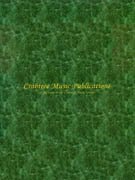Results
-
 £59.99
£59.99YOU RAISE ME UP (Trumpet or Cornet/Brass Band) - Lovland, Rolf - Duncan, Andrew
One of the greatest hit songs of this decade You Raise Me Up has been recorded by Russell Watson, Secret Garden, Michael Ball and, more recently (and perhaps best-known), by the great Irish boy-band Westlife. With your Solo Cornet taking the limelight this award-winning arrangement is one title that will be a surefire hit with both bands and audiences. Duration: 4:00 Grade: Medium. Also available with Piano Accompaniment. Recorded on Polyphonic QPRL218D Master Brass (Volume Fourteen). Duration: 3'30"
Estimated dispatch 7-14 working days
-
 £33.00
£33.00Deep Bond, The (Soprano Cornet/Brass Band)
Soprano Cornet Solo with Brass Band
Estimated dispatch 7-14 working days
-
 £26.50
£26.50Flying Scot, The (Cornet Solo/Brass Band)
Solo Cornet with Brass Band
Estimated dispatch 7-14 working days
-
 £42.95
£42.95GALLANT WEAVER, The (Cornet Trio/Brass Band) - MacMillan, James - Hindmarsh, Paul
for B flat Cornet Trio and Brass Band written by James MacMillan and arranged by Paul Hindmarsh
Estimated dispatch 7-14 working days
-
 £26.50
£26.50Miniature, The (Solo cornet/Brass Band)
Cornet solo with brass band
Estimated dispatch 7-14 working days
-
 £26.50
£26.50Nightingale, The (Solo Cornet/Brass Band)
Solo Cornet with Brass Band
Estimated dispatch 7-14 working days
-
 £59.99
£59.99ONCE UPON A TIME IN THE WEST (Soprano Cornet/Brass Band) - Morricone, Ennio - Duncan, Andrew
Soprano Cornet Solo & Brass Band. Duration: 3:00 Grade: Medium
Estimated dispatch 7-14 working days
-
 £26.50
£26.50Paragon, The (Solo cornet/Brass Band)
Cornet solo with brass band
Estimated dispatch 7-14 working days
-
 £20.00
£20.00Dance of the Blessed Spirits (Soprano Cornet/Brass Band) - Street, Allan
Soprano Cornet solo.
Estimated dispatch 7-14 working days
-
 £54.20
£54.20FRANK SINATRA (Cornet/Brass Band) - Wormald, Christopher
Grade: easy-medium. Three solos for Cornet & BB. Includes: All the Way; Guess I'll Hang My Tears Out to Dry; I've Got You Under My Skin.
Estimated dispatch 7-14 working days
